Types, Example, Forms and Uses - Grammar (Tense) | 10th English: UNIT 3 : Prose: Empowered Women Navigating The World
Chapter: 10th English: UNIT 3 : Prose: Empowered Women Navigating The World
Grammar (Tense)
Grammar
The term, 'Tense' denotes the time of action. They show when the work is done.
The English Tenses are :
1. Past
2. Present
3. Future
1. Present Tense
Forms and Uses of the Simple Present Tense
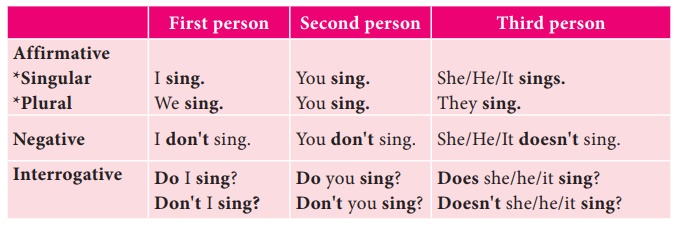
Note: Except for third person plural affirmative, the structure does not change for negative forms.
Now try framing plural negative and interrogative negative sentences.
Uses
· to express universal truths, facts, customs
· to express habitual, routine actions
· to express a permanent state
· in exclamatory sentences
· in subordinate clauses beginning with if and when
· in imperative sentences
· to indicate a planned future action or series of actions when they refer to a journey
· in running commentaries
· to introduce quotations
e.g. Mahatma Gandhi says, “Be the change you want to see in the world.”
Forms and Uses of Present Continuous Tense

Note: The contracted form of 'am not' is aren't and the contracted form of are not is also aren't.
Uses
❖ The Present Continuous Tense is used for an action that is in progress at the time of speaking.
❖ It is used for an action that is in progress and will continue in future.
e.g. Paul is learning English.
❖ It is used to denote an action that is planned to take place in the near future e.g. Yazhini is meeting the Prime Minister tomorrow.
❖ It is used along with adverbs such as 'always, constantly, repeatedly' etc. to express an action that has become a habit by doing it over and over again.
e.g. Sumithra is always asking questions.
Note: Verbs of perception and some other verbs are not generally used in the present continuous tense, for example see, smell, hear, taste, know, understand, hate, like, want, wish, etc.
Forms and Uses of Present Perfect Tense

❖ For an action which began in the past and is in progress now.
e.g. Bharani has called the fire man and they are on their way.
❖ To express an action that has been recently completed
❖ With adverbs like already, recently, yet,
❖ To express an action that began in past and is still continues up to the present
e.g. She has lived in this house for five years.
Note: We do not use adverbs of time denoting the past tense in Present Perfect Tense.
e.g. Father has returned from Vellore yesterday. (This sentence is wrong.) Father has returned from Vellore.
Forms and Uses of Present Perfect Continuous Tense

Note: Since is used for a point of time; For is used for a period of time
Uses
❖ To express an action which began at some time in the past and is still continuing and may extend into the future.
e.g. She has been studying since morning.
❖ To express an action in a sentence which begins with for how long or since when
❖ To express an action that began sometime in the past and has been just completed. However, its result is visible in the present.
e.g. I have been working on this project for five hours and I am tired now.
A. Complete the sentences in present tense forms.
1. Saravanan always goes (go) for a walk in the morning.
2. We gather (gather) here for a meeting and the chair person is yet to arrive.
3. Aruna has eagerly been waiting (wait) to meet her friend since morning.
4. Sheeba moves/will move (move) to a new house next week.
5. Naseera attends (attend) music classes regularly.
6. Ilakiya and Adhira enjoy (enjoy) each other's company very much.
7. Mani has been working (work) in this school for five years.
8. It is pouring (pour) outside now.
2. Past Tense
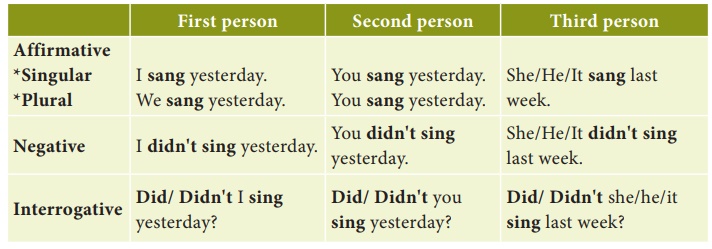
Forms and uses of the Simple Past Tense Uses
❖ To indicate an action that was completed in the past. Generally the adverbials of past time are used; sometimes without adverbials of time for an activity done in the past
❖ To express a habitual or regular action only in the past; It can also be expressed by using 'used to'
❖ In conditional clauses
❖ In the indirect form of speech
❖ To express two actions, where the first action leads instantly to the second action
e.g. When the meeting ended, the staff members came out.
Forms and Uses of Past Continuous Tense
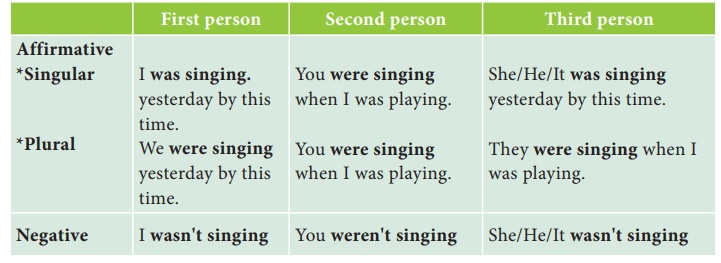
Uses
❖ To express a state or an action that was continuing at a certain point of time in the past. It had begun before that point and was probably continuing after it. We use adverbials of time.
e.g. We were decorating the house for the birthday party in the morning.
❖ To express an action that was in progress in the past
❖ To express an action in progress at some point of time in the past when another event took place
e.g. She was cooking when the guests arrived.
❖ To describe two or more actions continuing at the same time
e.g. While I was watching T.V., he was sleeping.
❖ To indicate a frequently repeated action or persistent habit in the past
e.g. Nithish was constantly complaining about something or the other.
Forms and Uses of Past Perfect Tense

Uses
❖ For an action that had been completed before another action began in the past
e.g. He had appealed to the manager for a week's leave before I reached.
❖ To describe an action or event which has been completed before some point of time.
e.g. By 11 a.m. all the students had left the school campus after the Independence Day celebration.
❖ To describe an action in the past which became the cause of another action
❖ To describe an action in the past using the time adverbials such as already, since, before, etc.
❖ To express an unfulfilled action in the past and unfulfilled wish in the past.
e.g. If he had informed her, she would have waited for him.
I wish I had accepted the job.
Forms and Uses of Past Perfect Continuous Tense.

Uses
❖ to describe an action in the past that had begun and had been going on for sometime before another action took place in the past
e.g. Mahi and Ragav had been arguing with each other when their mom arrived.
❖ to describe an action that had been going on for some time in the past
e.g. The students had been practicing for the last couple of weeks.
B. Complete the sentences in past tense forms.
1. I went (go) to her place on foot.
2. The children were playing (play) in the ground when the teacher arrived.
3. They were requesting (request) him when the manager arrived.
4. If you had worked (work) hard, you would have won the relay match
5. Joanna and Joy had already left (leave) for Ooty, when the others reached the station.
6. We all sang (sing) in the choir last week.
7. Nancy had always been asking (ask) for help.
8. The office goers waited (wait) for the train.
3. Future Tense
Future time in English can be expressed in the following ways:
(i) Simple Present Tense
e.g. She leaves this evening.
(ii) Present Continuous Tense
e.g.We are meeting the Prime Minister tomorrow.
(iii) be about to
e.g. The train is about to leave the station.
(iv) be going to.
e.g. Prices are going to rise.
by denoting the Principal clause of a conditional sentence.
e.g. If she works hard, she will get a scholarship.
Forms and Uses of Simple Future Tense.

Uses
❖ Shall is used with the second and the third persons to express determination, promise, intention, etc.
❖ Shall is used with the first person to express an offer or suggestion
❖ Will is used with the first person to express willingness, determination, etc
❖ The simple future is used to express the speaker's opinion, for something to be done in the future. We use verbs such believe, know, suppose, think, etc. We also use adverbs such as perhaps, possibly, surely, etc.
❖ It is used for an action that is yet to take place
Forms and Uses of Future Continuous Tense

Uses
❖ The Future Continuous Tense is used to express an action that will be in progress at a given time in future or in the normal course
e.g. We will be playing from 5 p.m. to 6 p.m The lift will be running in the month of May
The Future Perfect Tense.
Uses
❖ The Future Perfect expresses an action that is expected to be completed by a certain time in the future.
e.g. We will have completed our work by the time our sisters arrive.
❖ It is used to express the speaker's belief that something has taken place. In such sentences it does not express the future.
“You will have discussed the plans how to celebrate the function”, said my mother.
❖ It is also used for an action which at a given future time will be in the past.
e.g. In two years' time, I shall have earned my degree.
The Future Perfect Continuous Tense.
Uses
❖ The Future Perfect Continuous Tense is used to express an action that will have been going on at or before some point of time in the future.
By next June, I shall have been completing my studies.
Note: The less frequently used tense forms are Past Perfect Continuous Tense and Future Perfect Continuous Tense.
C. Fill in the blanks using the verbs in the brackets in the future form.
1. We shall not go to the market, in case it rains. (go)
2. Keerthi will have done his work by next week.(do)
3. The peon will have rung the bell by the time I reach the school.(ring)
4. I shall visit my sister's house next April if I go to Uttarkhand. (visit)
5. If you listen carefully, you will understand my point. (understand)
6. By next year, I shall have lived in Chennai for fifteen years. (live)
7. The new edition of this book will come out shortly. (come)
8. She hopes you will help her. (help)
D. Underline the verbs and identify the tense forms.
1. I am working hard day and night. Persent Continuous Tense
2. The Moon revolves around the Earth. Simple Present Tense
3. Were the milk men milking the cow? Past Continuous Tense
4. He received your messages last night.
5. I have been ill for a couple of days. Present Perfect Tense
E In the following passage, some words are missing. Choose the correct words from the given options to complete the passage.
Raghav (a) is born in a middle class family. He is a (b) school going boy of 8. His mother (c) works as a software engineer in an MNC. (d) Drawing is his favourite hobby. He (e) won the first prize in school level competition for drawing last week. He (f) started drawing at the age of 3. His mother (g) hopes he (h) will become a great painter in future.
(a) (i) will be born (ii) is born (iii) born (iv) has born
(b) (i) school-going (ii) going to school (iii) school coming (iv) school gone
(c) (i) working (ii)works (iii) has worked (iv)will work
(d) (i) drawn (ii) had drawn (iii)drawing (iv) having drawn
(e) (i) win (ii) was winning (iii) wins (iv)won
(f) (i) was starting (ii) starting (iii) started (iv) is starting
(g) (i) hoped (ii)hoping (iii) hopes (iv) has hoped
(h) (i) will become (ii) becomes (iii) would become (iv)will be becoming
F. The following passage has not been edited. There is one error in the tense of the verb in each line. Write the wrong word as well as the correct word in the given place. One is done for you.
When Anand reach Arun's place, his -
friends have arrived already. Arun -
introduces Anand to them. Arun's brother -
buy some snacks from the market. -
Arun serving it to all his friends. Then -
they all sat together to planning their holidays. -
Arun have a cottage in Ooty, so -
they all plan to go to Ooty during the holidays. -
“Would we have a good time?, asked Arun. -
They all cheerfully say, “Yes!” -
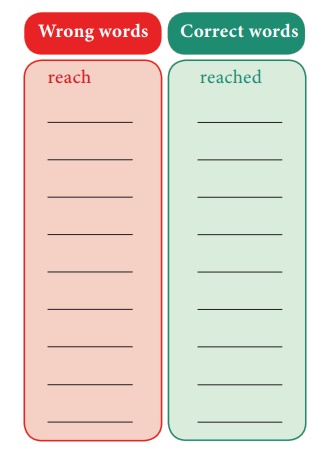
G. Read the story and rewrite it using the simple past tense.
Juno the elephant is lonely and tries to make friends with the other animals in the forest. But, the other animals refuse to play with Juno because of his size. One day, all the animals are running away from Dera the tiger who is eating everyone he finds. Juno goes and gives Dera a swift kick. Dera immediately runs away. Juno is now everyone's friend.
Answer
Juno the elephant was lonely and tried to make friends with the other animals in the forest. But; the other animals refused to play with Juno, because of his size. One day, all the animals ran away from Dera the tiger, who ate everyone he found. Juno went and gave Dera a swift kick. Dera immediately ran away. Juno was now everyone’s friend.
H. Read the situations given and frame two suitable sentences in the appropriate form of the tenses.
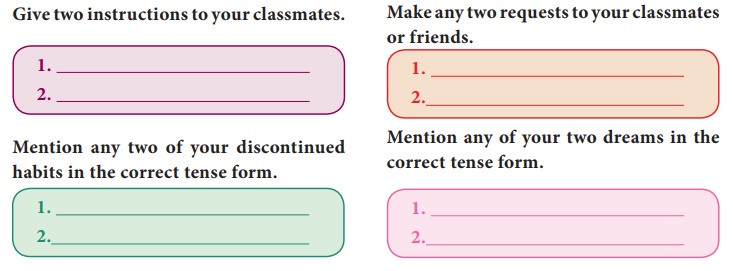
Give two instructions to your classmates.
1. Don ’t write on the wdll.
2. Be punctual.
Mention any two of your discontinued habits in the correct tense form.
1.I used to quarrel with my friends.
2. I gave up drinking coffee.
Make any two requests to your classmates or friends.
1. Please give me your record.
2. Kindly go with me to the library.
Mention any of your two dreams in the correct tense form.
1. I dream that I will buy a car.
2. I always dream of becoming a millionaire.
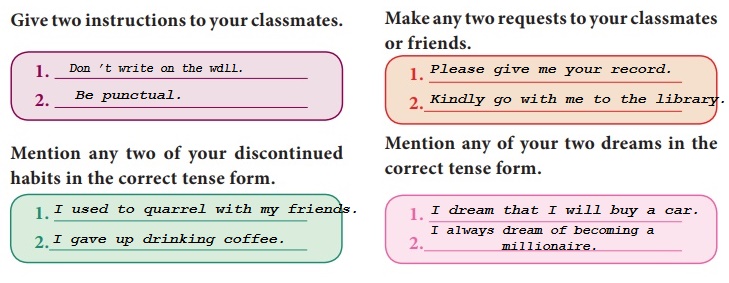
Related Topics